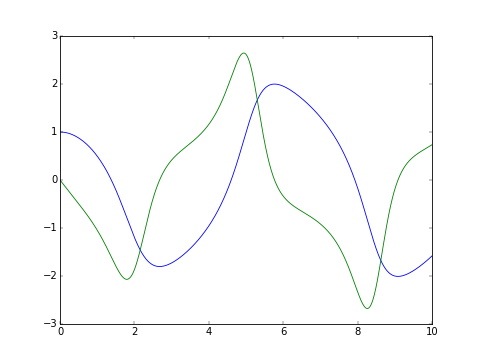Welcome to pyodeint’s documentation!¶
Contents:
Indices and tables¶
Overview¶


pyodeint provides a Python binding to odeint. Currently, the following steppers are exposed:
rosenbrock4: 4th order Rosenbrock (implicit multistep) stepperdopri5: 5th order DOPRI5 (explicit runge-kutta)bs: Bulirsch-Stoer stepper (modified midpoint rule).
The Rosenbrock4 stepper requires that the user provides a routine for calculating the Jacobian.
You may also want to know that you can use pyodeint from
pyodesys
which can e.g. derive the Jacobian analytically for you (pyodesys also provides
plotting functions, C++ code-generation and more).
Documentation¶
Autogenerated API documentation for latest stable release is found here: https://bjodah.github.io/pyodeint/latest (and the development version for the current master branch are found here: http://hera.physchem.kth.se/~pyodeint/branches/master/html).
Installation¶
Simplest way to install is to use the conda package manager:
$ conda install -c conda-forge pyodeint pytest
$ python -m pytest --pyargs pyodeint
tests should pass.
Binary distribution is available here: https://anaconda.org/bjodah/pyodeint
Source distribution is available here: https://pypi.python.org/pypi/pyodeint
here is an example of how to build from source:
$ CPATH=/opt/boost_1_65_0/include python3 setup.py build_ext -i
Examples¶
The classic van der Pol oscillator (see examples/van_der_pol.py)
>>> from pyodeint import integrate_adaptive # also: integrate_predefined
>>> mu = 1.0
>>> def f(t, y, dydt):
... dydt[0] = y[1]
... dydt[1] = -y[0] + mu*y[1]*(1 - y[0]**2)
...
>>> def j(t, y, Jmat, dfdt, fy=None):
... Jmat[0, 0] = 0
... Jmat[0, 1] = 1
... Jmat[1, 0] = -1 -mu*2*y[1]*y[0]
... Jmat[1, 1] = mu*(1 - y[0]**2)
... dfdt[0] = 0
... dfdt[1] = 0
...
>>> y0 = [1, 0]; tend=10.0; dt0=1e-8; t0=0.0; atol=1e-8; rtol=1e-8
>>> tout, yout, info = integrate_adaptive(f, j, y0, t0, tend, dt0, atol, rtol,
... method='rosenbrock4', nsteps=1000)
>>> import matplotlib.pyplot as plt
>>> series = plt.plot(tout, yout)
>>> plt.show()

For more examples see examples/, and rendered jupyter notebooks here: http://hera.physchem.kth.se/~pyodeint/branches/master/examples
See also¶
pyodesys for how to automatically generate the jacobian callback function (and easily swtich to other solvers).
License¶
The source code is Open Source and is released under the very permissive
“simplified (2-clause) BSD license”. See LICENSE for further details.
Contributors are welcome to suggest improvements at https://github.com/bjodah/pyodeint